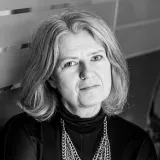Engaged research is better research. As a research scientist, I know from firsthand experience that better science comes from engaged research and the same is true in other disciplines. “We need structure and systematic understanding of what engaged research is and how to do it, acknowledging that it is unwieldy and that it's different in different disciplines. There needs to be more consideration of the needs, not just what academia needs to get from engaged research, but also the partners.
Professor Sally Marlow, Professor of Practice in Public Understanding of Mental Health Research
05 September 2025
Symposium brings together staff, students and academics to bolster skills in engaged research
The King’s Engaged Research Symposium brought together students, staff and leading academics to discuss best practice of engaged research.

The event sparked conversations about the future of engaged and participatory research, with key discussions about patient and public involvement (PPI) and developing creative partnerships. It was attended by 50 PhD students and early career researchers, aiming to gain a deeper understanding of how public and community engagement shapes more inclusive and impactful research practices.
The symposium, which included a keynote, panel discussions and practical workshops, was hosted by the King’s Engaged Research Network (KERN). KERN is a dynamic network that brings together professional service staff and researchers dedicated to developing, sharing, and celebrating public and community engagement.
Professor Sally Marlow, Associate Dean for Impact and Professor of Practice in the Public Understanding of Mental Health Research at King's College London, opened the symposium by sharing her insights on the value of engaged research. Professor Marlow is a leading academic at the Institute of Psychiatry, Psychology & Neuroscience, and a regular BBC radio broadcaster. She cited the benefits of collaboration, the value of diverse perspectives, and the need for systemic support to make engaged research effective and sustainable.
Attendees were then invited to two panel discussions on participatory research and partnerships including academics from the Institute of Psychiatry, Psychology & Neuroscience, Faculty of Natural, Mathematical & Engineering Sciences, Faculty of Life Sciences & Medicine, alongside external guests, Chelsea Jackson, political scientist and social justice consultant, and Raza Griffiths from the ESRC Centre for Society and Mental Health’s Lived Experience Advisory Board.
During the discussions, panellists shared their insights on building partnerships that ensure research questions and methods are relevant and meaningful to stakeholder communities. Chelsea also highlighted the importance of using accessible language when interacting with community groups.
Rather than assuming that your audience won't understand your research question because it's so complex and difficult, it's probably just the language you're using that's not accessible to them. It's much more important that we make sure our language is accessible and reachable to the communities that we want to connect with.
Chelsea Jackson, Political Scientist and Founder of Equity Architects
The afternoon provided attendees the opportunity to gain practical skills through workshops, providing a casual space to engage in expert-led discussions on key topics, including:
- Communicating Research
- Research Collaborations and Partnerships
- Participatory Research
- Funding Engaged Research
- Integrating Creative Practice
- Evaluating Engaged Research
This event was a wonderful opportunity for PhD students and early career researchers to interface with faculty and staff specialising in public and community engagement. The atmosphere was immediately collaborative, fuelled by the enthusiasm of the symposium participants. I’m delighted that attendees left the event feeling motivated to further develop their approaches towards inclusive and equitable research.
Dr Asma Bashir, Public Engagement Manager, King's College London
The workshop, held on 14 July, concluded with a sharing and reflection session, led by Eleonora Aiello, Participatory Research Coordinator for the KERN and a PhD student within the School of Education, Communication & Society.
KERN is committed to continuing to foster these conversations, supporting researchers and community partners alike in developing more impactful and equitable research.

